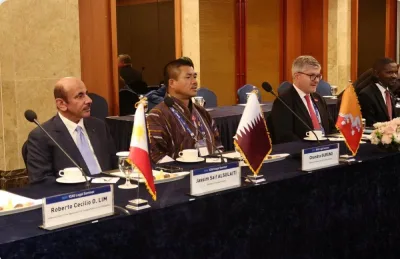The aviation industry continues to adapt to survive amid the largest crisis in the history of flight.
This week we’ll start in the United States where major US airlines have agreed in principle to a $25bn rescue package that will keep workers in their jobs until October as the industry battles the coronavirus crisis.
Alaska Airlines, Allegiant Air, American Airlines, Delta Air Lines, Frontier Airlines, Hawaiian Airlines, JetBlue Airways, United Airlines, SkyWest Airlines and Southwest Airlines will all receive government cash amid the pandemic. Other airlines may join the programme, and the department is reviewing applications for smaller passenger air carriers “as quickly as possible.” “We look forward to working with the airlines to finalise the necessary agreements and disburse funds as quickly as possible”, Treasury Secretary Steven Mnuchin explained during an extended White House briefing this week.
The US government support for the industry will see major carriers receive cash to pay workers, with 30% eventually paid back. In the case of smaller carriers receiving $100m or less in help, no money will need to be repaid to the US treasury.
Meanwhile, Delta Air Lines has now officially confirmed it will take over the order of 10 Airbus A350 jets originally cancelled by LATAM Airlines. Delta recently finalised its purchase of a 20% stake in South American airline giant, LATAM — and the news of the Airbus jet order takeover will come as a relief to Airbus who are facing a large number of order cancellations as airlines run out of cash.
The aircraft manufacturer is already reducing the production of new jets. It usually produces more than 60 of A320 family jets every month at assembly lines in Toulouse and Hamburg but said it would reduce that to 40. It will also cut A330 production to two per month and A350s to six per month. “The impact of this pandemic is unprecedented,” said Airbus chief executive officer, Guillaume Faury. “At Airbus, protecting our people and supporting the fight against the virus are our chief priorities at this time. Our airline customers are heavily impacted by the Covid-19 crisis. We are actively adapting our production to their new situation and working on operational and financial mitigation measures to face reality.”
Turkish Airlines -- the airline flying to more countries than any other airline in the world -- has extended the cancellation of all international flights until late-May, at the earliest.
Kuwait will fly around 40,000 citizens back to the country from around the world on nearly 200 flights, over 10 days. Kuwait Airways, Qatar Airways & Jazeera Airways are part of the operation, the largest repatriation in the Gulf country’s history.
Here in Doha, Qatar Airways and Standard Chartered have signed and finalised their $850mn financing deal for seven Boeing 787-9 aircraft, which positioned here to the country earlier this month, but will not enter service for some time.
Meanwhile, passengers returning to Japan are now being tested for Covid-19 upon landing, and then all must stay at the airport while they wait for results. UK airports remain open to all incoming flights with no checks/measures/etc for any passengers or flights (there never has been) plus no isolation rules — questionable, to put it lightly.
Elsewhere, while the world has been understandably preoccupied with Covid-19 pandemic, constant fake bomb reports are becoming somewhat of a norm for Russian air travel. Since March, there have been over 200 bomb threats on Russian passenger flights — with many needing to divert en route as a result. The source of the threats remains unknown.
Further north, Finnair, the flag carrier of Finland, will convert the passenger cabins of two relatively new Finnair Airbus A350 jets for cargo use. The airlines’ cargo division has already ‘built an air bridge’ between Europe and Asia, carrying key medical supplies on various cargo aircraft. Fellow oneworld alliance member airlines including Qatar Airways, are doing the same.
In East Africa, Rwandair will receive a government financial relief package amid the crisis. The small, but fast-growing airline continues to utilise its A330 jets for cargo purposes only, flying essential aid between Kigali and London, Guangzhou, and Brussels.
Finally, will social distancing on aircraft become normal in the immediate aftermath of this pandemic? Well, for some airlines, it’s likely the middle seat will be kept free for social distancing. This week, IATA agreed they expect some airlines to adopt ‘de-densification’ — reducing passenger numbers in an attempt to maintain social distancing within the plane.
The desire for extended personal space on airline jets will be a priority of many passengers going forward, and I believe that the public will not suddenly feel comfortable and content with the idea of being crammed into 10-across seating simply because the Covid-19 curve has flattened a bit. I’m sure the concept of social distancing on board is something we’ll hear much more about from airline leaders over the coming weeks.
In the meantime, stay tuned for further updates from across the industry — stay home, and stay safe.
*The author is an aviation analyst.



